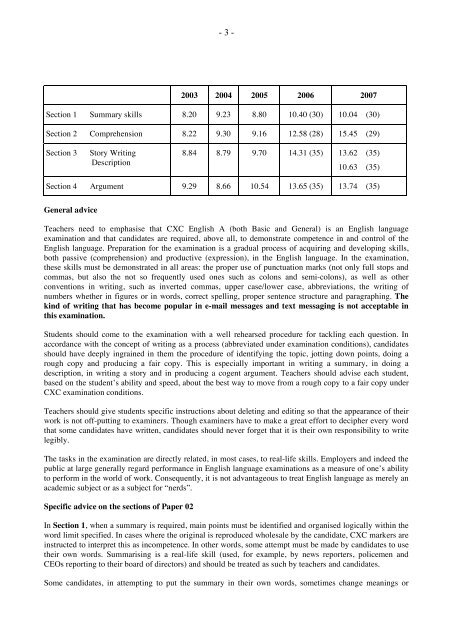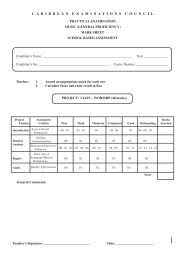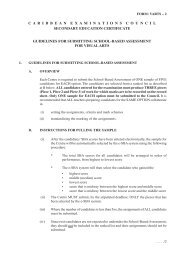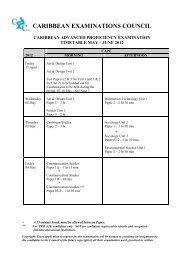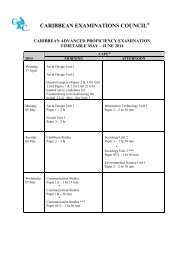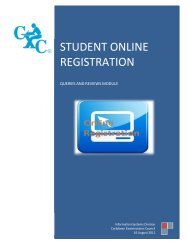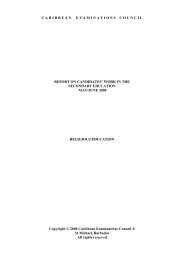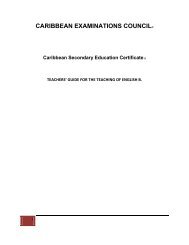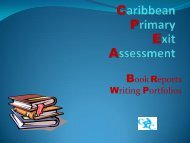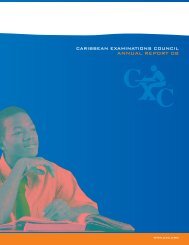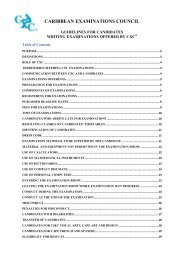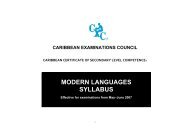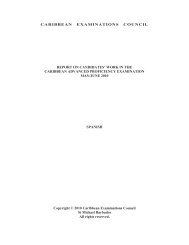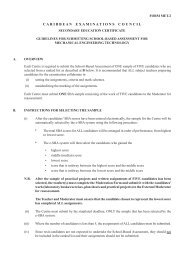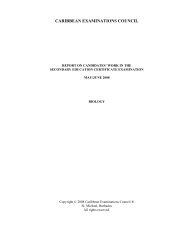English A - Caribbean Examinations Council
English A - Caribbean Examinations Council
English A - Caribbean Examinations Council
You also want an ePaper? Increase the reach of your titles
YUMPU automatically turns print PDFs into web optimized ePapers that Google loves.
- 3 -2003 2004 2005 2006 2007Section 1 Summary skills 8.20 9.23 8.80 10.40 (30) 10.04 (30)Section 2 Comprehension 8.22 9.30 9.16 12.58 (28) 15.45 (29)Section 3Story WritingDescription8.84 8.79 9.70 14.31 (35) 13.62 (35)10.63 (35)Section 4 Argument 9.29 8.66 10.54 13.65 (35) 13.74 (35)General adviceTeachers need to emphasise that CXC <strong>English</strong> A (both Basic and General) is an <strong>English</strong> languageexamination and that candidates are required, above all, to demonstrate competence in and control of the<strong>English</strong> language. Preparation for the examination is a gradual process of acquiring and developing skills,both passive (comprehension) and productive (expression), in the <strong>English</strong> language. In the examination,these skills must be demonstrated in all areas: the proper use of punctuation marks (not only full stops andcommas, but also the not so frequently used ones such as colons and semi-colons), as well as otherconventions in writing, such as inverted commas, upper case/lower case, abbreviations, the writing ofnumbers whether in figures or in words, correct spelling, proper sentence structure and paragraphing. Thekind of writing that has become popular in e-mail messages and text messaging is not acceptable inthis examination.Students should come to the examination with a well rehearsed procedure for tackling each question. Inaccordance with the concept of writing as a process (abbreviated under examination conditions), candidatesshould have deeply ingrained in them the procedure of identifying the topic, jotting down points, doing arough copy and producing a fair copy. This is especially important in writing a summary, in doing adescription, in writing a story and in producing a cogent argument. Teachers should advise each student,based on the student’s ability and speed, about the best way to move from a rough copy to a fair copy underCXC examination conditions.Teachers should give students specific instructions about deleting and editing so that the appearance of theirwork is not off-putting to examiners. Though examiners have to make a great effort to decipher every wordthat some candidates have written, candidates should never forget that it is their own responsibility to writelegibly.The tasks in the examination are directly related, in most cases, to real-life skills. Employers and indeed thepublic at large generally regard performance in <strong>English</strong> language examinations as a measure of one’s abilityto perform in the world of work. Consequently, it is not advantageous to treat <strong>English</strong> language as merely anacademic subject or as a subject for “nerds”.Specific advice on the sections of Paper 02In Section 1, when a summary is required, main points must be identified and organised logically within theword limit specified. In cases where the original is reproduced wholesale by the candidate, CXC markers areinstructed to interpret this as incompetence. In other words, some attempt must be made by candidates to usetheir own words. Summarising is a real-life skill (used, for example, by news reporters, policemen andCEOs reporting to their board of directors) and should be treated as such by teachers and candidates.Some candidates, in attempting to put the summary in their own words, sometimes change meanings or


